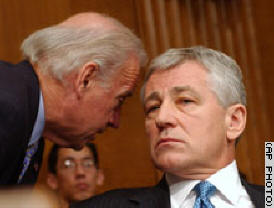
Sens. Joe Biden, left, D-Delaware,
and Chuck Hagel, R-Nebraska,
consult Thursday during hearings on the Iraq war.
• Biden warns
secretary of state against cross-border raids
• Hagel makes comparison to bombing of Cambodia during
Vietnam War
• Rice says president will do what's necessary to protect
troops
Capitol Hill, where senators warned Bush against widening the nearly four-year-old war.
Sen. Joseph Biden, the chairman of the Senate Foreign Relations Committee, warned Secretary of State Condoleezza Rice that Bush did not have the authority to send U.S. troops on cross-border raids.
"I believe the present authorization granted the president to
use force in Iraq does not cover that, and he does need
congressional authority to do that," Biden, D-Delaware, said
during a Thursday hearing on Iraq. "I just want to set that
marker." (Watch
heated exchanges between Rice and several senators
![]() )
)
Rice did not directly reply to Biden's remark, but she said the country expects Bush "to do what is necessary to protect our forces." Biden sent a follow-up letter to the White House after Thursday's hearing, calling on Bush to explain his position.
In his Wednesday night speech announcing the deployment of
more than 20,000 additional troops to Iraq, Bush blamed Iraq's
neighbors for stoking the violence there and accused Iran in
particular of "providing material support for attacks on
American troops." (Watch
how the plan will work
![]() )
)
"We will disrupt the attacks on our forces. We'll interrupt the flow of support from Iran and Syria. And we will seek out and destroy the networks providing advanced weaponry and training to our enemies in Iraq," he said.
Sen. Chuck Hagel, R-Nebraska, said Rice's responses had echoes of the debate over the Vietnam War, when the Nixon administration denied U.S. troops were conducting raids into neighboring Cambodia to stop the flow of weapons to South Vietnam's communist insurgency. Hagel, a veteran of that war, called Bush's plan "the most dangerous foreign policy blunder in this country since Vietnam." (Full story)
"When our government lied to the American people and said we didn't cross the border going into Cambodia, in fact we did. I happen to know something about that, as do some on this committee," he said. "Madame Secretary, when you set in motion the kind of policy that the president is talking about here, it's very, very dangerous."
Defense Secretary Robert Gates told the House Armed Services Committee that U.S. troops are trying to crack down on the spread of Iranian-supplied explosives into Iraq, and the administration is "making it clear that those who are involved in activities that cost the lives of American soldiers are going to be subject to actions on the part of the United States inside Iraq."
Gen. Peter Pace, the chairman of the Joint Chiefs of Staff, told reporters that "we can take care of the security for our troops by doing the business we need to do inside of Iraq."
Thursday, U.S. troops in the northern Iraqi city of Irbil detained six Iranians "suspected of being closely tied to activities targeting Iraqi and coalition forces," a military statement said. Iran and the Kurdish regional government called for their release. (Full story)
Recent decisions by the president could suggest that the administration is giving Syria and Iran more attention.
The president announced that he had ordered a second aircraft carrier battle group to the Persian Gulf and would share Patriot air-defense missile systems with U.S. allies in the region.
Furthermore, the choice of a Navy officer, Adm. William Fallon, was Bush's pick to lead U.S. forces in the Middle East has raised speculation that operations in the Persian Gulf will take on greater importance.
White House spokeswoman Dana Perino told CNN that Bush's condemnation of what she called "Iran's meddlesomeness" was an important signal to the region.
"Surely the United States is not the one being threatening," she said. "We are not the ones being meddlesome and troublesome in Iraq."
Throughout the process, the Bush administration has stuck to its refusal to consider direct talks with Iran and Syria in an effort to resolve the war, as the bipartisan Iraq Study Group recommended in December.
Rice said talks with Tehran and Damascus over Iraq "put us in the role of supplicant" while Washington is trying to pressure Iran to halt uranium enrichment and get Syria to stop leaning on Lebanon's pro-Western government.
"Do we really believe that the Iranians are going to treat Iraq over here and not demand that we do something to alleviate the pressure that we are now bringing on their nuclear program and their nuclear ambitions? I don't think it's going to happen," she said.
